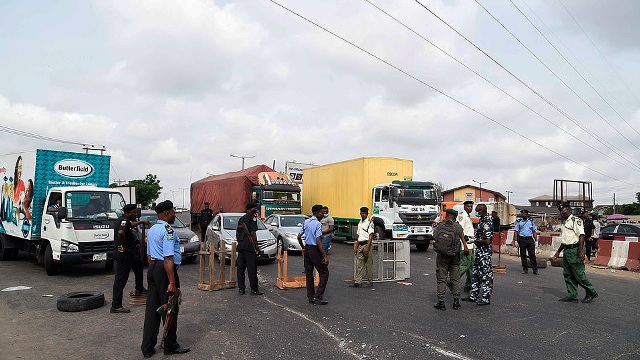Ime Akpan
It appears that the recent directive by lawmakers in Nigeria’s house of representatives to the inspector general of police to dismantle multiple checkpoints on the roads leading to and from Lagos and Abuja to the southeast is only advisory.
The lawmakers also asked the Nigeria Police Force and related agencies to immediately disband all checkpoints at the Onitsha head bridge in Anambra State.
Even if the IGP issues the directive, his foot soldiers will always run rings around him as I witnessed recently while travelling from Lagos to Uyo, Akwa Ibom State.
The journey, which took close to 72 hours, began on Monday, November 15 when I conveyed some household items to Uyo. We took off around 9.45 pm on Monday for, according to the driver, it was better that way so that he could beat the gridlock at the bedlam called Onitsha.
The first fright came around 10.30 pm when we got to a certain place in Ogun State where we ran into a band of brigands with a gun-wielding policeman, who seemed to have been high on negative substance, leading the pack.
The other members of the team were armed with cudgels, sticks, dangerous-looking spikes, and whatnots.
“Park”, the marauders shouted in unison as if responding to a command on the parade ground.
The driver pulled up.
“Park well, leave the road. Wetin dey for inside your motor?”
The driver hesitated.
“Oga, na household goods I carry,” he responded.
At that point, the policeman came closer and barked at the driver: “You no hear park well? You dey craze? You wan make I blow your head dis night? No try me o.”
I became afraid and told the driver to park properly.
He obliged and moved to the right. It was drizzling and visibility was fairly good.
While the driver made effort to park, the marauders stood some meters away from the front of the vehicle and directed the driver to move to the right.
A short, pot-bellied one-eyed man who claimed to have been a local government staff walked up to the driver and told him to buy a ticket for N500. The slightly-limped man produced something that looked like a receipt booklet from the pocket of his thoroughly weather-beaten ankara dress and began to scribble something.
A ticket this night! I was appalled.
The driver interrupted him.
Driver: Don’t write anything for me o. I’ve said that I’m conveying household goods. They are not commercial items. I pass here almost every other day and I buy your ticket. As for this one, I no go pay.”
As soon as he said that, a young man who I presume, was either in his late twenties or early thirties made at the driver and in a guttural voice threatened him saying: “You say na house things you carry and you no go pay? Okay, you no collect money? You go wait here tire. Na me and you today. Look, if you try nonsense, we go burst your tyre. Idiot,”
As soon as he said that, a young man, who was either in his late twenties or early thirties, made at the driver and threatened: “You say na house things you carry. Okay, you no collect money? You go wait here tire. Na me and you today. Look, if you try nonsense, we go burst your tyre. Idiot,” he ranted as he walked away.
I noticed some things about that young man. He was very skinny – tiny legs; neck like that of an ostrich; a protruding Adam’s apple that needed a tracheal shave; sunken eyeballs; and a proboscis-like nose. I doubt if his waist size measures up to 27 centimetres.
He seemed to have been chosen by the gang to be a nightmare to motorists. Armed with spikes – in both hands – that could demobilise any type of vehicle, he stood in front, bared his teeth at the driver, and challenged him to move.
At that point, I reasoned that I would be the greater loser should those guys, whose identities could not be ascertained, become riotous with the backing of the policeman.
I told the driver to pay the N500 ‘levy’ but he refused. To save the situation, I offered to pay. Thereafter the brigands cleared the way for the vehicle to move but not after the enigma had rained down Yoruba invectives and curses on the “idiot driver.”
We could not continue on the journey that night and had to sleepover at a nameless rundown filling station in Ijebu-Ode.
At 4.30 am on Tuesday, November 16, we set out. Somewhere around Shagamu where the RCC reconstruction the road, the construction workers mounted roadblocks and collected N100 from motorists plying the repaired portions of the highway.
At every one kilometer of the repaired portion, the driver dropped N100 into the ‘offering hand’ of the RCC boys who wore the company’s reflective jackets on overcoats, or sweaters of no particular colour.
At some toll points, I observed the RCC ‘toll managers’ drinking something scooped from a boiling cauldron and dancing around it (cauldron) like the three witches in William Shakespeare’s Macbeth.
At such places, one of them would leave to collect the toll and clear the metal bar for the vehicle to drive past. Thereafter, he would rejoin his colleagues in the fight-off-the-cold gyration.
After Shagamu, it became glaring to me why the driver, had, before we left Lagos, brought some six dozens of bottled water onboard the vehicle.
From Ore in Ondo State to Umunede in Delta State, the driver had to drop two and sometimes six bottles of water, depending on the security outfits manning such checkpoints.
At some checkpoints, I observed that the security personnel engaged the locals to drive the collection.
I also observed that the civilian staff, whether ‘employed’ by the police or army wore a beret of the force as a symbol of authority.
If a driver became refractory, the officer ‘boss’ staying under a shed, roofed with palm fronds, would bark orders out to the driver to cooperate or “your eye go see pepper if I stand up from here come meet you.”
At a certain place somewhere in Benin, the FRSC, police and army personnel manned checkpoints within spitting distance of the other. This meant the driver would drop six bottles of water – two apiece. But guess what happened. An FRSC officer came to us and demanded for a tip.
The driver offered N500 but he insisted on N1000.
“We are an elite force. We work smart. My Oga is watching and he wouldn’t like anything incriminating,” he told the driver who parted with the agreed sum. The others collected two bottles of water each.
As the journey progressed, I asked the driver why water, instead of money, changed hands. He explained that the problem of change resulted in the conversion of the “monetary tip” to water.
“The drivers had a problem with the checkpoint managers whenever they dropped N500 for instance and demanded for N300 change. It always led to arguments and delays. So, we met and resolved that two bottles of water and sometimes one would solve the problem. The ‘stakeholders’ agreed and took it from there,” he said.
I also observed that there were some security operatives that the driver used his discretion to give money.
I began to calculate how many bottles of water were dropped at each checkpoint, how many would be accumulated at the close of work and what the security personnel used them for.
“They cannot be drinking everything considering the number of vehicles that ply the road,” I said within me.
I reasoned aloud and engaged the driver and the bus attendant in the discussion. Both said it is either they sell to hawkers, restaurateurs or take it home to their families.
“It’s good business if they sell it considering the quantum of commercial vehicles that stop at the collection points. The bottles are counted in hundreds at the end of the day,” I told them.
However, the driver told me that not all the commercial vehicles plying the highway were taxed. According to him, drivers who work for established transport firms like God is Good Motors, Peace Mass Transit, Cross Country, GUO, Akwa Ibom Transport Company, ABC Transport, and other companies that have what he described as “institutional identity,” are exempted from the ‘water tax.’
By the time we got to Uyo, fewer bottles of water remained.
We arrived in Umunede around 3 pm where the driver stopped to avoid the gridlock at the Niger Bridge at Onitsha.
We set out again around 6 pm when the road was relatively free. At Onitsha, we ran into a swarm of yahoos who demanded money at all costs. To save the vehicle from vandalisation, the driver parted with some money. We met similar gangs of unruly boys at five different locations before we got to Idemili South local government area of Anambra State where the driver stopped at the gate of the Independent National Electoral Commission (INEC) to fix technical fault in the vehicle.
From there, we had a smooth sail to Oba, the hometown of Obi Cubana. That was around 9 pm.
From the INEC office up to Abia State and beyond, there was no police presence on the road. Due to the bad roads in the oriental states and the fear of IPOB, the driver had to pass through remote villages in Ihiala area council in Anambra, Orsu and Orlu in Imo State, and Ngwa in Abia State to get to Obot Akara and there to Essien Udim both in Akwa Ibom State and connect Ikot Ekpene Road to Uyo.
In the southeast, we had to contend with the vigilante groups in the villages. They mounted roadblocks in virtually all the villages we passed and charged motorists between N500 and N1000. They chose bad portions on the roads to block motorists. You have to think twice before you argue with them. They never cared to find out the type of goods conveyed. As long as you do the needful, you are good to go.
With the recent arrest of suspected kidnappers and cannibals in Ihiala and Orsu which I passed through in the dead of night, what would have been my fate had such bad guys were on the road that time? I reflect on Daniel who came out from the lions’ den unscathed and Shadrach, Meshach and Abednego who were cast into a blazing furnace but came out alive.
My heart was in my mouth as we traversed the remote oriental villages and met those vicious-looking boys, who, except the ‘cashiers’ had their hands tucked into their pockets. I got to Uyo on Wednesday at 3.30 am. From a journey that began on November 15, 2021.
In T. S. Eliot’s ‘Journey of the magi’ where the narrator, after the frustration and doubt of such a trip says “I should be glad of another death,” I doubt if I can say the same.































































